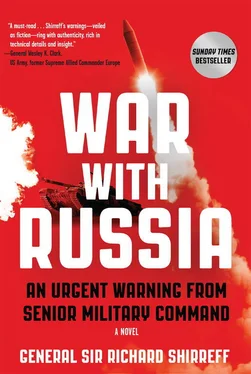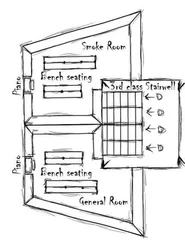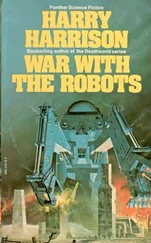“We may have to leave Riga in a hurry, Tom,” Krauja said. “We’ll need to be able to move fast and be self-sufficient.”
“Shouldn’t you be looking after yourself, Marina?” Tom had been determined not to drag Krauja into peril on his account.
“No, Tom. I will do what I was ordered to do. My boss told me to stay with you and your team. It’s important. You and your radios may be the only way we can get the full story to the outside world.” Dressed in trekking trousers, hiking boots and a T-shirt with a fleece top, she had placed her rucksack on the floor beside Morland’s bergen.
Her blonde hair was tied back, her face flushed from the fresh night air, and Morland noticed a new light in her blue eyes. Keeping her voice calm, she brought him up to date on the night’s events so far. “I’ve just called in at the Constitution Protection Bureau office. They’re getting reports that Russian airborne troops have been landing by parachute onto the international airport and there’s a second landing somewhere to the east of the city, as we can hear gunfire from that direction. The Latvian battalion and the National Guard protecting the airport are fighting back, but Russian troop-carrying helicopters are now landing more men and vehicles. It looks as if it will only be a matter of time before we are overwhelmed.”
Morland thought fast. Better get the news to PJHQ to alert them. And then get “eyes on” to confirm what was happening .
Krauja read his mind. “We need to get this news out quickly, Tom.”
Once again, Corporal Steve Bradley set up the Inmarsat VTC. From his steady and practiced movements, Morland would not have known this was not another drill, instead of preparing to report the start of a war.
Major Jerry Dingley, from the Baltic desk at PJHQ in Northwood, came into the picture and was quickly joined by Lieutenant Colonel Nicholas Graham, the bespectacled Baltic team leader.
Without any preamble or formality, Morland briefed him on what he knew.
In return, Graham told him that PJHQ were getting reports that the Russian Baltic fleet had left St. Petersburg and signal traffic indicated submarine activity off Riga, Tallin, Helsinki and Stockholm. “We need to know what is happening in Riga, Tom,” the colonel continued. “Chief of Joint Operations is briefing Chief of the Defense Staff before he heads into COBRA, the Cabinet Office Briefing Rooms, in a couple of hours. Things are likely to move pretty quickly now. Your mission is for you and your team to report back what is happening. You guys are our only eyes on the ground. We need to get confirmation—photos, that sort of thing—that the Russians have landed. Once you have hard proof that it is Russian regular forces, you are to send it here ASAP and then get out. Without getting involved. Do you understand me?”
Morland nodded, but did not speak. He felt diminished, agreeing these instructions in front of Marina. Here she was, willing to put her life on the line to help them. And here he was, obeying orders to get some incriminating photos prior to escaping.
“No heroics,” stated Graham. “The government doesn’t want dead or captured British soldiers in Latvia. That would tie their hands politically…”
Graham stared at Morland down the screen, clearly unconvinced he had accepted his orders. “There’s nothing you can do to help Latvia except get those photos. Do you understand? Proof. Out. That simple.”
“Yes, Sir.”
The colonel continued, “The minehunter HMS Padstow arrived in Riga yesterday with the NATO Standing Mine Counter Measures Group. She’s been told to take you out. But she’s getting ready to leave in a couple of hours, so you’ll need to get your skates on. Head out to Riga International Airport and see what’s happening. We need hard evidence that the Russians are on the ground and that it’s an invasion, before we can properly protest what is happening. Then get back to Padstow .”
“We’ll do our best, Sir. I’ll report back once we’re on Padstow .”
Morland checked his watch: 0355. He thought quickly. The streets were empty so, if Krauja was prepared to drive them, it wouldn’t take more than 45 minutes to get into a place where they could observe the international airport. Then 25 minutes back to the quayside where Padstow was tied up. Add a fudge factor of 30 minutes… and round it up. He looked at Krauja inquiringly. He didn’t need to ask.
She nodded. “Of course I’ll drive you.”
Morland looked back at the screen. “Can you tell the Captain of Padstow we’ll aim to be with him by 0630 latest. Any later than that and something will have gone wrong. But don’t worry, we’ll stay out of trouble. We’re recce. We observe without being spotted.”
“Will do. Good luck.” The Baltic Team faded from the screen and the Inmarsat was quickly packed away.
“Come with me, guys.” Krauja was being as decisive as ever. “I’ve picked up a Land Cruiser from the office. There’s plenty of room for us all and our equipment. I know the back roads to the airport. We’ll take a look and I’ll get you to your ship… then I’ll need to get back to my office. Some of us will have a war to fight.”
Morland said nothing, stung by the barb. He would shortly be returning to safety in England, and despite his direct orders to the contrary, he felt that he would be deserting Krauja.
He suppressed a momentary, idiotic thought, that he could persuade her to join him on the ship and so keep her out of harm’s way. But one look at the determined tilt of her jaw and he knew that to even hint at such a suggestion would be deemed a grave insult. And in that moment, and contrary to all his training, he realized that he was thinking of her as a woman and no longer as a fellow professional.
“The ambassador…,” he almost stammered in his confusion, needing something to say. “I’d… I’d better brief him.”
While the team shouldered bergens, picked up weapons and their other kit and clattered downstairs to Krauja’s car, Morland found the ambassador in his office. He and his staff were gathering files for incineration. Morland quickly explained his new orders, bid him farewell and good luck, then joined the team outside.
“Let’s go, Marina.”
Krauja needed no urging. Ignoring the now-working traffic lights, she drove the packed Toyota Land Cruiser fast through the empty streets, before crossing the bridge over the swollen River Daugava in the growing light of near dawn.
Twenty minutes later, Krauja halted amid a group of high-rise flats on the edge of the western suburbs of Riga and Morland wound his window down. Ahead of them he heard explosions, while occasional flashes and tracer rounds arced into the air. He checked his map. The airport was still several kilometers away to the west, but it was clear that there was a major firefight going on out there.
“I can get closer, Tom.” Krauja showed no fear.
“As long as we can keep under cover, that’s OK,” replied Morland. “We don’t want to get into the open.”
“We’ll take the Jurmala cycle path. That’s the way we bike to the beach in summer. It’s wide enough for this vehicle and it skirts the airport perimeter. It goes through the forest, so we won’t be seen.”
Fifteen minutes later, they were driving smoothly along the cycle path running through the forest. Finally Krauja stopped, reversed off the track into the trees and cut the engine. She pointed, but did not need to. The firefight was very close now and it was light enough for Morland to see the high, iron-link perimeter fence.
“Through the trees and you’ll see the airport.”
“De-bus!” Morland ordered.
The team jumped out of the Land Cruiser, shook out into a V formation to ensure all-round observation and moved the short distance to the edge of the forest from which, just as promised, they overlooked the northern perimeter of the airport. Krauja stayed with the vehicle, guarded by Corporal Paddy Archer, ready for a quick getaway.
Читать дальше












